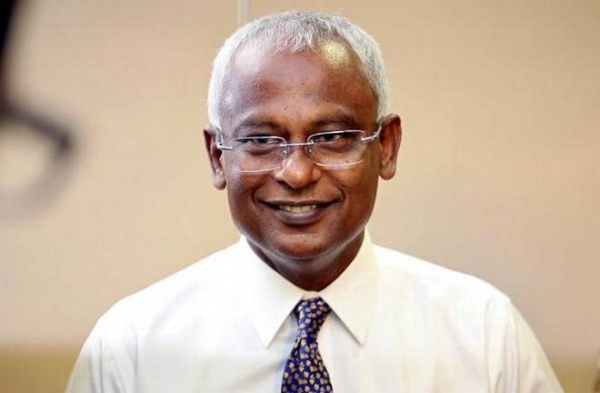"The will of the people has spoken,” said Maldivian Opposition candidate Ibrahim Mohamed Solih, after his victory became evident late on Sunday, and called upon incumbent President Abdulla Yameen to ensure smooth transition of power.
“For many of us it has been a difficult journey. A journey that led to a prison cell, or years in exile. It’s been a journey that led to the complete politicisation and breakdown of public institutions. But it’s been a journey that has ended in the ballot box, because the people willed it,” Mr. Solih, 54, said in Male.
Many political analysts draw parallels between the Solih and Maithripala Sirisena, Sri Lanka’s Common Candidate of the opposition who ended the 10 year rule of former President Mahinda Rajapaksa, in January, 2015.
Solih’s manifesto and slogans echoed those of Siriena who pledged to end oppression, corruption and nepotism.
Following ex-President Mohamed Nasheed’s decision in June to exit the presidential race, the joint Opposition led by his Maldivian Democratic Party (MDP) decided to field a common candidate. The unlikely coalition — of MDP with the Jumhooree party, Adalat party, and a faction of the ruling Progressive Party (PPM) — chose Mr. Solih to fight a political rival they all shared.
Though well known for his reform efforts, Solih, for most of his political career as a lawmaker since 1994, maintained a low-profile until he began campaigning in the run up to the Sunday’s polls.
“The message is loud and clear,” he said on Sunday. “The people of the Maldives want change, justice and stability.”
On Sunday, as many as 2,62,135 voters had a chance to choose between incumbent President Abdulla Yameen and Mr. Solih in a poll that came with the promise of change.
Maldivian authorities allowed only select international observers and media to visit Male on poll day, denying visas to others that the Elections Commission had earlier accredited. However, terming the poll “the most perfect election” in the Maldives, Ahmed Akram, Commissioner and spokesperson at the Maldives Elections Commission said that the voter turnout was likely to be 85% or more, hours before the total votes polled was declared.
The election came under close international scrutiny, which the government resisted, but for many voters, it also brought with it a promise of brighter days. (With inputs from The Hindu)










